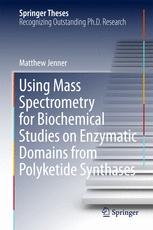

Most ebook files are in PDF format, so you can easily read them using various software such as Foxit Reader or directly on the Google Chrome browser.
Some ebook files are released by publishers in other formats such as .awz, .mobi, .epub, .fb2, etc. You may need to install specific software to read these formats on mobile/PC, such as Calibre.
Please read the tutorial at this link: https://ebookbell.com/faq
We offer FREE conversion to the popular formats you request; however, this may take some time. Therefore, right after payment, please email us, and we will try to provide the service as quickly as possible.
For some exceptional file formats or broken links (if any), please refrain from opening any disputes. Instead, email us first, and we will try to assist within a maximum of 6 hours.
EbookBell Team

4.8
14 reviewsThis thesis reports studies on the substrate specificity of crucial ketosynthase (KS) domains from trans-AT Polyketide Synthases (PKSs). Using a combination of electrospray ionisation-mass spectrometry (ESI-MS) and simple N-acetyl cysteamine (SNAC) substrate mimics, the specificity of a range of KS domains from the bacillaene and psymberin PKSs have been succsessfully studied with regard to the initial acylation step of KS-catalysis.
In addition, the ability to alter the substrate tolerance of KS domains by simple point mutations in the active site has been demonstrated. A series of acyl-ACPs have been synthesised using a novel methodology and employed to probe the substrate specificity of both KS domains and the previously uncharcterised acyl hydrolase domain, PedC.
KS-catalysed chain elongation reactions have also been conducted and monitored by ESI-MS/MS. All KS domains studied exhibited higher substrate specificity at the elongation step than in the preceeding acylation step. Furthermore, a mechanism of reversible acylation is proposed using the PsyA ACP1-KS1 di-domain. The findings in this thesis provide important insights into mechanisms of KS specificity and show that mutagenesis can be used to expand the repertoire of acceptable substrates for future PKS engineering.